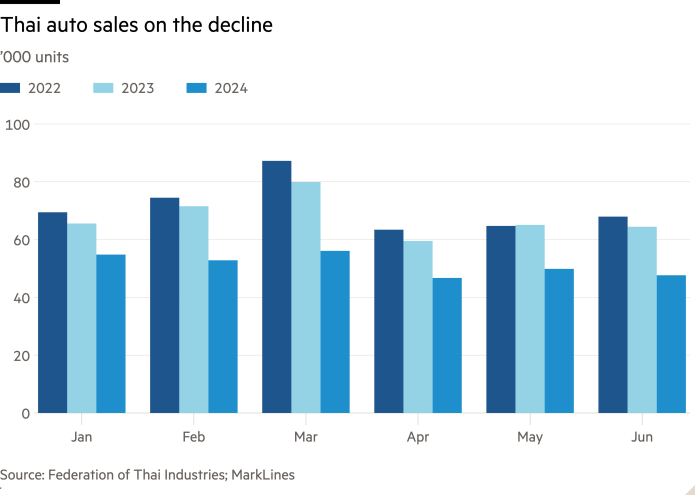
Hello everyone, this is Cissy from Hong Kong.
Is China’s ecommerce sector on the brink of a sea change? In May, I started to hear from sources that cross-border sellers on Temu were planning to hold demonstrations at the platform’s operational headquarters in the southern city of Guangzhou to protest what they saw as the platform’s unreasonable fines.
Several protests ended up taking place, they said. Initially, photos and video showed only a dozen or so sellers gathered outside Temu’s office building. On Monday last week, there were more than 100 and by this Monday, hundreds of sellers had joined the protest. Dozens of them broke into Temu’s office and demanded the return of the allegedly unfair fines, and Temu asked all of its staff to evacuate the office, according to multiple sources.
Over a dozen sellers have said the platform started to increase the pace of fines since the beginning of the year, mostly for reasons such as “buyer doesn’t like the product” or “items falling short of expectations” without further explanation. The sellers would only be told which order and which item had been returned, but not the specific customer.
Protests like these are a symptom of the fierce price wars that bargain apps like Temu and compatriot Pinduoduo have unleashed on the Chinese ecommerce industry. Bigger rivals have struggled to fight back with their own ultra-low price strategies, but a change is now in the air.
Realising that they can’t win on price alone, some of China’s biggest online retailers are attempting to shift to a more sustainable growth model.
How low is too low?
The heated price war among Chinese ecommerce platforms is showing signs of cooling, with TikTok sister app Douyin and Alibaba’s Taobao switching gear from prioritising ultra-low prices to increasing total online sales, writes Nikkei Asia’s Cissy Zhou.
More ecommerce platforms are realising that competing on price is not a viable strategy for taking on Pinduoduo, which has spent years building a reputation for offering the best deals. Douyin, for example, implemented a “low price first” strategy in the first half of the year, but total online sales grew slower than expected to between 30 per cent to 40 per cent, compared to over 50 per cent last year, people familiar with the situation told Nikkei.
Taobao, meanwhile, has launched a “store experience” rating system that drives traffic to merchants with better customer service scores, while downplaying its “five-star pricing system” introduced last year, which evaluated product pricing compared to similar items on other platforms.
The shift comes as a temporary anti-unfair competition regulation for the internet industry is set to take force on September 1. The new rules prevent platforms from “imposing unreasonable restrictions on the prices of goods”.
Temu tumult
Online marketplace Temu has caused a storm in ecommerce since its launch in September 2022. Bernstein analysts forecast that the Chinese platform will this year generate $54bn in gross merchandise revenue, or the total value of goods sold on its platform.
But while shoppers in the West have delighted in the knockdown prices of goods flown in from warehouses in China, Temu’s supplier base in the southern city of Guangzhou is pushing back against the platform’s increasingly aggressive tactics, write Eleanor Olcott and Tina Hu for the Financial Times.
Earlier this week, dozens of suppliers swarmed the company’s offices in Guangzhou, protesting the platform’s practice of handing out fines over issues ranging from faulty packaging to customer complaints over mismatches between the product and online description.
The protests come as Temu makes an ambitious pivot to overhaul its business model — a plan that relies on building a large and trusting supplier base — as it seeks to compete more directly with Amazon.
Discount discontent

The Thai government may be celebrating the opening of a $486mn BYD plant in early July, but owners of the Chinese EV maker’s cars are less than thrilled, according to Nikkei Asia’s Francesca Regalado.
In an attempt to maintain its lead in a more competitive market, BYD offered additional discounts of up to 340,000 baht ($9,460) on its Atto 3 SUV last month. The move has angered current BYD owners and some are exploring the possibility of a class-action lawsuit.
As Asia’s second-largest auto market, Thailand is facing the triple threat of weak economic growth, high consumer debt and an abundance of electric vehicles largely imported from China. Amid this backdrop, Thai drivers are delaying their purchases, expecting still more discounts from carmakers towards the end of the year.
Total auto sales have declined 24 per cent in the first six months of this year from the same period in 2023. In June, only 47,600 vehicles were sold, nearly 17,000 fewer than last year.
TSMC goes to Europe
Taiwan Semiconductor Manufacturing Co will hold a groundbreaking ceremony next month for its first plant in Europe, the latest milestone for the world’s top chipmaker as it expands its global production footprint, sources briefed on the matter told Nikkei Asia’s Cheng Ting-Fang.
TSMC chair and CEO CC Wei will lead a delegation from the company and host equipment and material suppliers, clients and government officials in Dresden on August 20 in a demonstration of the chipmaker’s dedication to its investments in Germany.
The Dresden plant is scheduled to go into operation by late 2027, and it will represent a “new dimension for sustainable semiconductor production in Europe”, according to the invitation seen by Nikkei Asia.
TSMC’s European joint venture has secured major chipmaking clients like Infineon, Robert Bosch and NXP, each holding a 10 per cent stake. This grand project, costing over $10.8bn, is designed to cater to the European Union’s need for localised automotive and industrial chips.
Suggested reads
-
India expands airport facial recognition amid surveillance fears (FT)
-
Samsung’s comeback marred by AI chip woes despite strong Q2 (Nikkei Asia)
-
US reveals security concerns around TikTok and ByteDance (FT)
-
Honda, Nissan and Mitsubishi join forces to catch Tesla in EV race (Nikkei Asia)
-
Cost is key for south-east Asia to attract EV investment, BCG says (Nikkei Asia)
-
Mitsubishi Electric bets on price hikes amid headwinds in China, Europe (Nikkei Asia)
-
Apple’s iPhone elbowed out of top 5 in China by domestic smartphone rivals (FT)
-
Is the yen behind the tech sell-off? (FT)
-
Japan snack giant Calbee looks to bring AI to potato chips (Nikkei Asia)
-
UK election body failed to protect voter data before Chinese cyber attack, says watchdog (FT)
#techAsia is co-ordinated by Nikkei Asia’s Katherine Creel in Tokyo, with assistance from the FT tech desk in London.
Sign up here at Nikkei Asia to receive #techAsia each week. The editorial team can be reached at [email protected].